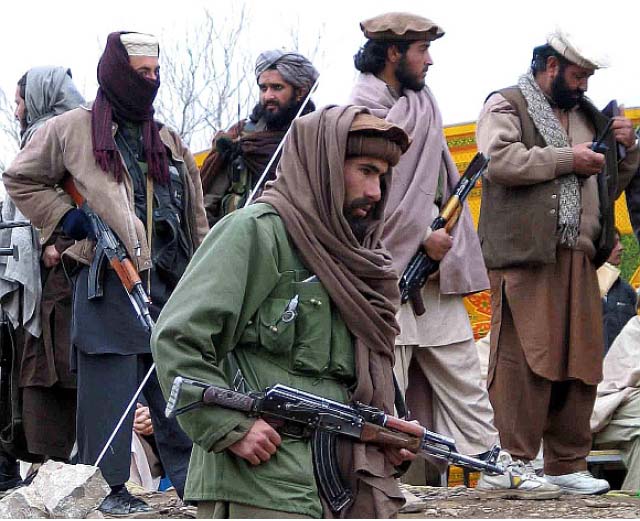At least 20 people were reportedly killed and 25 wounded in Tuesday’s suicide bombing outside a police station in Kabul, for which the Taliban claimed responsibility. Despite the reverberation of resuming peace talk, the blood of Afghan police and civilians are spilled frequently and their rights to life and liberty are violated on a large scale by the Taliban militants. To the officials’ unmitigated chagrin, the terror and insurgency continue unabated, although the Taliban have given Afghan government the green light to sit around the negotiating table.
Afghanistan’s Former President Hamid Karzai has inveighed against the US officials for lack of tendency to support this war-torn country in campaign on terrorism and believed that signing Bilateral Security Agreement (BSA) was futile since no peace and security exist. “At a time when there is no peace, inking the security pact with the US doesn’t benefit Afghanistan. We had demanded the US to start the process of peace in Afghanistan more serious and tangible and if the US acted upon its undertakings and the Afghanistan peace process, we would consider the security pact as fruitful,” he is quoted as saying. According to him, the security situations deteriorate with each passing day and there is no hope in public air for peace.
During the last months of his presidency, Hamid Karzai spoke in strong tone against the Obama’s administration as US officials urged him to sign the security pact. He criticized the way the US aid was spent to Afghanistan and said the money paid to security firms created militias which caused lawlessness, corruption and highway robbery. He said, “They then began systematically waging psychological warfare on our people, encouraging our money to go out of our country. What they did was create pockets of wealth and a vast countryside of deprivation and anger.” Exchanging harsh tone between US officials and Karzai’s government created a deep mistrust between Kabul and Washington. For instance, president Karzai accused America of torturing innocent Afghans in Bagram Detention Center, blamed US forces for civilians’ deaths, night raids and air strike and likened the United States to a “colonial power.”
In an interview with Washington Post, the salient points of Karzai’s talks were about the casualties inflicted on the innocents. On an effort to raise concerns with President Obama during a 2010 visit, he said, “I went to Washington and I carried a picture with me. It was a picture of a night raid where an extremely poor family — it’s night and it’s dark in that picture, a frightened, weak, afraid woman sitting there with two or three children around them — and the hand of the man lying there. . . . And this frightened family, looking into nothing, just gazing, with fright and fear. And I took that picture to the president of the United States, and I said, ‘President, this is what I’m trying to end, the intimidation of Afghan families at night, in the name of fighting the Taliban.”
However, on September 30, 2014, National security adviser Hanif Atmar and US Ambassador James Cunningham signed the long-delayed security agreement, in a televised ceremony at the presidential palace, to allow American troops to stay in the country after the end of the year, filling a campaign promise by President Ashraf Ghani. “As an independent country, based on our national interests, we signed this agreement for stability, goodwill, and prosperity of our people, stability of the region and the world,” Ghani said in a speech after the signing.
Subsequently, US officials applauded the BSA as a new chapter in US-Afghanistan relations. Secretary of State John F. Kerry, who played a key role in brokering the new Unity Government, said that the Afghan people “are determined to choose unity over division.”
“This is a beginning not an ending, and with all beginnings the toughest decisions are still ahead,” he said. “As Afghanistan enters this new chapter in its history, the United States looks forward to deepening its enduring partnership with a sovereign, unified and democratic Afghanistan.” In his address, Ghani called upon the Taliban and another armed faction, Hezb-i-Islami, to enter “a political negotiation” with the new government, saying that “we are tired of fighting and our message is peace, but this does not mean we are weak.”
However, Taliban reacted angrily against signing BSA. Zabiullah Mujahid, denounced the security pact, declaring it an attempt by the United States to assert its authority over Afghanistan and its people. “Under the cover of the Security Agreement America wants to occupy our land and nation, and make our people suffer,” Mujahid said in an e-mailed statement.
But the Afghan people, who wished and prayed for having the security pact signed, breathed a sigh of relief and believed that violence and bloodshed had ended with this agreement and the US soldiers would adopt more serious strategy towards the militants. To be honest, the situation did not change for better, rather the political turmoil emerged stronger and the self-styled Islamic State of Iraq and Syria (ISIS) also gained foothold in the country.
Now, the US along with China and Pakistani officials seek to bring the Taliban to the negotiating table. But it should be noted that in final days of his presidency, Karzai said that peace negotiation was a correct strategy to end terrorism. However, Karzai’s misadministration such as releasing the Taliban militants, who were considered dangerous by the US officials, from Bagram prison also got the public blame. Now the public hope that resuming peace talk will be a panacea for their bleeding wounds.
Home » Opinion » Political Turmoil Continues
Political Turmoil Continues
| Hujjatullah Zia

